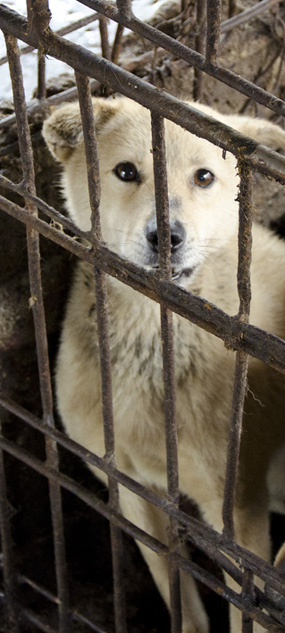


Dogs raised for the meat markets are often taken from the street or stolen from families. These animals are kept almost their entire lives confined in wire cages where they suffer terribly both physically and psychologically. Whilst in the cramped cages, they are scared. They suffer from hunger, extreme temperatures, and a lack of food and water.
Their deaths are horrific: various blows to the head leave the animals in a semi-conscious state before being stabbed to death. The dogs are bled out and die after agonising minutes whilst struggling in a desperate bid to stay alive.
Both organisations have joined forces in a campaign to end the consumption of dog meat and its production in China. Just like you, millions of people, in China and beyond, believe that cat and dog slaughter for human consumption is absolutely unacceptable. This is why we are urging the Chinese government to prohibit this cruel trade immediately.
Help us stop the massacre!
By signing our petition you are letting the Chinese Government know that you are against the consumption of dog and cat meat, aswell as the use of their fur. It is vital to add your signature to the thousands of people who have already joined this campaign to ensure that this practice becomes history, once and for all.
Cruelty and an abhorrent death
Dog meat is not only eaten in China, but also in other countries such as Vietnam, South Korea, Thailand, India, Indonesia and the Philippines.
In China, dog meat has been eaten for thousands of years and, in some parts of the country, it is considered a socially acceptable practice that is even promoted by the government. Dog meat is thought to have medicinal properties, and is popular in winter months as it is believed to warm the body. It is particularly popular in the northeast of the country, along the border of Korea, but it is also consumed in the southern regions of Guizhou, Guangdong and Guangxi.
It is estimated that over 18 million dogs are killed each year for their meat or fur in China. These animals spend practically their entire lives in cages, surrounded by dirt and faeces. They consume a poor quality diet which causes the dogs to become weak and diseased. Some resort to cannibalism.
Most of the dogs in the meat trade industry within China have been caught from the streets, others have been bred on illegal farms or even kidnapped from loving homes.
After being transported to the slaughterhouse in cages where the dogs can barely move, an abhorrent death awaits them. Most of the dogs are clubbed ad beaten violently on the head with sticks, hung upside down, stabbed in the thorax region, bled out, or electrocuted. On many occasions, the animals do not die instantly, they lose consciousness only briefing, before being stabbed to death.
Legalities
Although it is illegal to eat dog meat in many countries around the world, law enforcement is weak and it continues being a popular dish even where it is prohibited.
Countries such as the Philippines or Taiwan have included animal welfare acts to ban the trading and eating of dog meat, but the law is not enforced.
Although China does not currently have in place legislation to protect animals, in 2010 a draft animal welfare legislation was proposed to prohibit the consumption of dog meat. Chinese animal protection groups however have predicted that this legislation will not be effective at curbing the trade. Some areas of China however, such as Hong Kong, have effectively introduced bans on dog meat consumption.
In South Korea, 2 million dogs are killed each year for their meat, and although the Korea Food & Drug Administration recognises all edible products as ‘food’, other than drugs, Seoul has passed a regulation classifying dog meat as a ‘repugnant food’. Once again, however, the regulation has so far been ineffective at stopping the demand for dog meat.
See the photos of the investigation!
